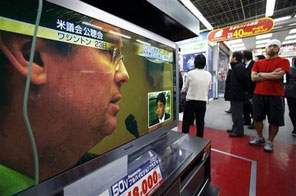Toyota chief's testimony closely watched in Japan
TOKYO: Japan appeared largely relieved Thursday that much-anticipated testimony by Toyota's chief executive before U.S. lawmakers was finally over, though analysts said the company's recall woes are no closer to being solved.
Toyota Motor Corp. President Akio Toyoda's appearance before the House Oversight and Government Reform Committee, was closely watched in Japan, where the company his grandfather founded is a national icon. It was the top item on local morning news programs. At least one channel briefly broadcast his testimony live, where it took place Wednesday in Washington.
News shows, including those on national broadcaster NHK, showed clips of Toyoda reading introductory remarks in English and answering questions from lawmakers, generally characterized as "severe" in nature. One channel, the private TV Asahi, however, suggested what Toyoda faced was less harsh than that seen in another hearing Tuesday which he did not attend.
A colorful Fuji TV morning show, which mixes political, entertainment and social news, characterized Toyoda as the "prince under attack," a reference to his sometimes being referred to as company royalty, given his relationship to the company founder. The network later showed a tearful Toyoda appearing after the hearings with U.S. Toyota dealers.
Analysts gave Toyoda passing marks for his performance amid blistering questioning from lawmakers.
Koji Endo, managing director at Advanced Research Japan in Tokyo, acknowledged that the session was "a little a bit harsh" and noted that some of the lawmakers appeared frustrated by Toyoda's use of an interpreter and answers that were not as clear as they would have liked.
"But it's not getting too political, as we thought might happen," he said. "Toyoda-san doesn't seem awkward, he seems to be sincerely giving his responses. My impression is that it's not that bad."
Ryoichi Shinozaki, a crisis management expert at Kyodo Public Relations Co. in Tokyo, said, that by Japanese standards, Toyoda's performance was acceptable and was an improvement on the one given the day before by a top American executive with the company.
"By Japanese standards, he was doing his best," Shinozaki said. "He answered the questions and he appeared comfortable."
Shinozaki, however, said that the company's crisis was deepening because of other factors such as possible defects in the electronic throttle, new investigations by federal authorities and possibilities there may be cover-ups.
"The problems aren't going away," he said after watching the hearing on TV. "The hearing is over, but the crisis is only getting more serious."
Japan said late Wednesday that it was examining 38 consumer complaints about sudden acceleration of Toyota vehicles in the first official indication that concerns about runaway cars are starting to trickle into the company's home market.
"I expect Toyota to pay attention to safety thoroughly and improve things that need to be improved," Prime Minister Yukio Hatoyama told reporters Thursday, according to Kyodo News agency.
Endo, the analyst, said the ultimate fallout for Toyota in terms of how much its sales drop due to the crisis remains unclear.
"Hopefully there will be no more major recalls and the company can fix the problems as quickly as possible," he said. "It will take the next couple months to see what impact will be."
___
Associated Press writers Malcolm Foster, Yuri Kageyama, Shino Yuasa and Mari Yamaguchi contributed to this report.






